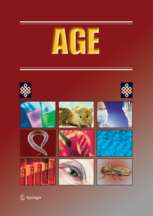GeroScience
GeroScience (formerly Age; Journal of the American Aging Association) is a scientific journal focused on the biology of aging and on mechanistic studies using clinically relevant models of aging and chronic age-related diseases. The journal also publishes articles on health-related aspects of human aging, including biomarkers of aging, multisystem physiology of aging and pathophysiology of age-related diseases. [1].
 | |
| Discipline | Aging |
|---|---|
| Language | English |
| Edited by | William E. Sonntag, PhD, Zoltan Ungvari, MD, PhD |
| Publication details | |
Former name(s) | Age, Journal of the American Aging Association |
| History | 1978–present |
| Publisher | |
| Frequency | Monthly |
| Standard abbreviations | |
| ISO 4 | GeroScience |
| Indexing | |
| ISSN | 0161-9152 (print) 1574-4647 (web) |
| Links | |
Topics
GeroScience covers topics like chronic low-grade inflammation, cellular senescence, macromolecular damage, oxidative-nitrative stress, maladaptation to cellular and molecular stresses, impaired stem cell function and regeneration, alterations in proteostasis, epigenetic dysregulation, impaired mitochondrial function and cellular metabolism; strategies to improve cardiovascular, neurocognitive, and musculoskeletal health-span; studies using a variety of experimental approaches, including in vivo studies and investigations using isolated tissue preparations and cultured cells; the molecular and cellular mechanisms underlying aging processes; evolutionary biology, biophysics, genetics, genomics, proteomics, molecular biology, cell biology, biochemistry, alternative and complementary medicine (including studies on natural compounds in the context of aging research), endocrinology, immunology, physiology, pharmacology, neuroscience, and veterinary sciences (including veterinary pathology).
Management
It is published by Springer Science+Business Media. The editor-in-Chiefs are William E. Sonntag, PhD. and Zoltan Ungvari, MD, PhD (from 2020), Deputy Editors are Veronica Galvan, PhD and Holly Brown-Borg, PhD [2]
In 2020, GeroScience was included in the Clarivate list of "Journals Suppressed from 2019 JCR Data" due the fact that percentage of all 2019 outgoing citations from the journal to 2018 or 2017 scholarly literature categorized as journal self-citations exceeded the usual ranges for journals in the Geriatrics & Gerontology category[3]. This issue has been addressed by the journal by including a request to authors to limit citations to papers published in Geroscience[4] and by publishing titles of papers included in Special Issues as a figure, instead of part of the reference list in editorials.
References
- "American Aging Association". American Aging Association. Retrieved 2018-05-14.
- "GeroScience. Details Page: Editorial Board". Springer. Retrieved 14 May 2018.
- "Journals Suppressed from 2019 JCR Data".
- "GeroScience/Springer Instructions to Authors".